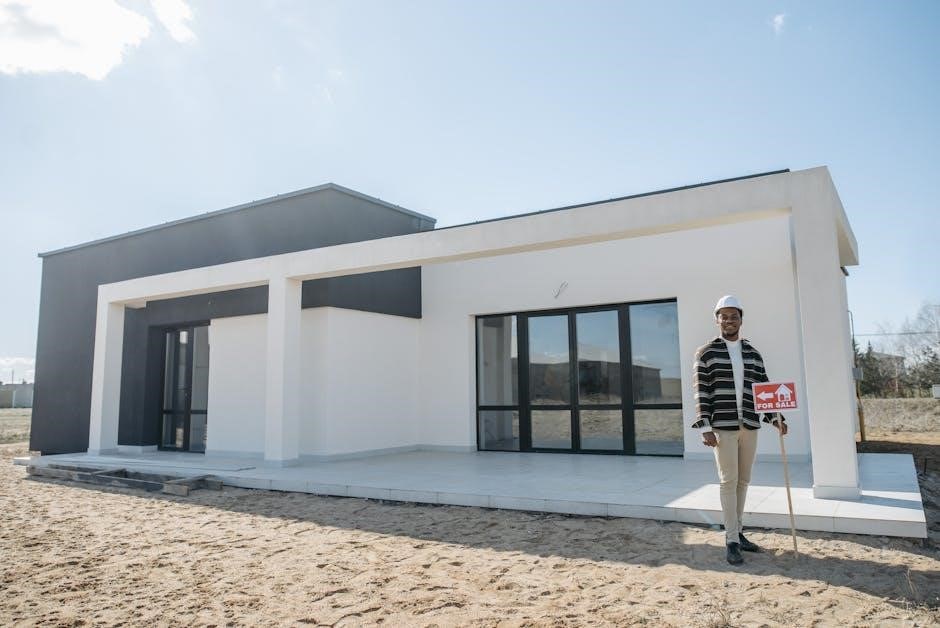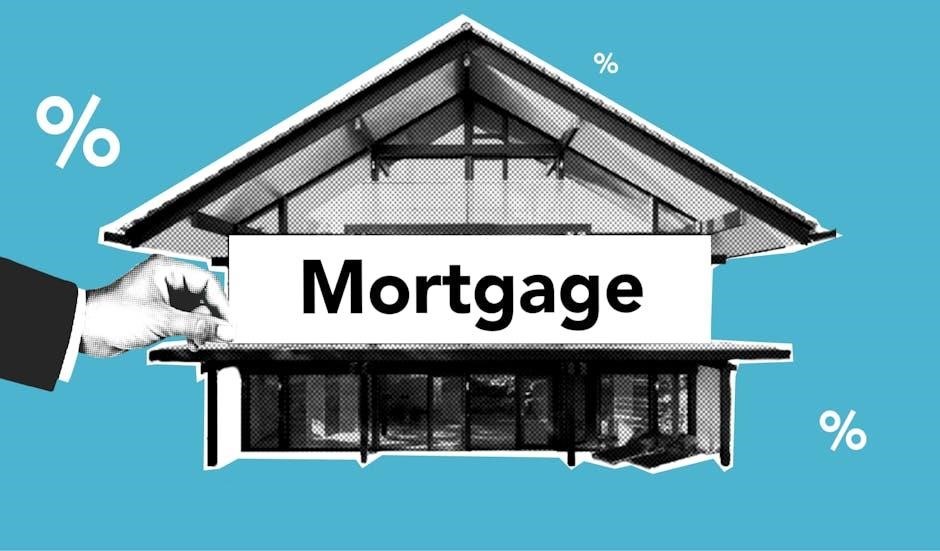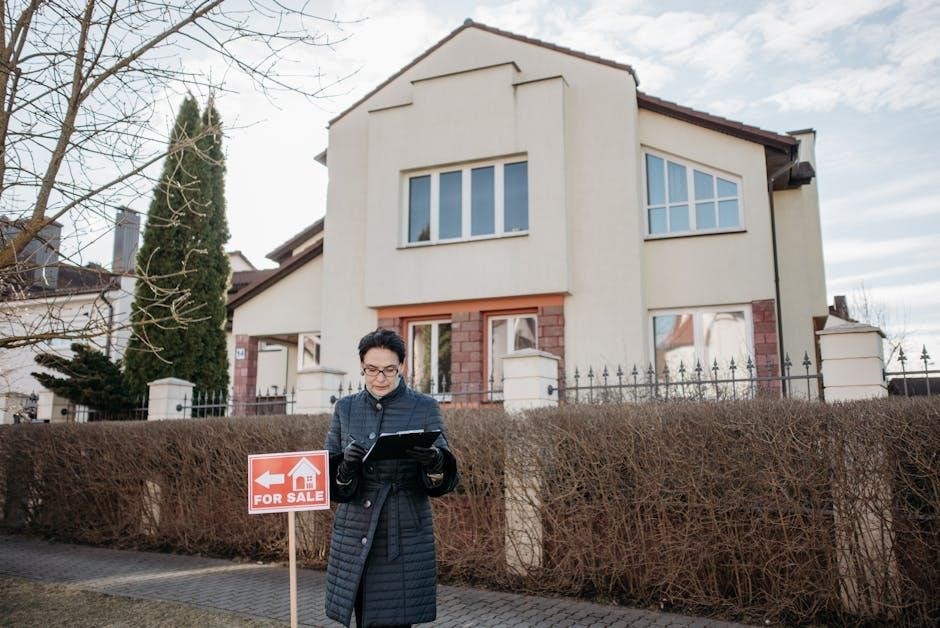Effective communication is the backbone of success in real estate, helping agents build trust and rapport with clients. It ensures clear understanding of needs and preferences.
Mastering the right phrases and tone enables agents to connect emotionally, address concerns, and guide clients confidently through transactions, ultimately driving satisfaction and long-term relationships.
The Importance of Verbal and Non-Verbal Communication in Real Estate
Effective communication in real estate is a blend of verbal and non-verbal cues, both equally vital for building trust and understanding with clients. Verbal communication involves clear, concise, and empathetic dialogue, ensuring clients feel heard and valued. It also includes active listening, which helps agents understand needs and preferences. Non-verbal cues, such as body language, eye contact, and tone of voice, convey professionalism and sincerity. Together, these elements create a positive first impression and foster meaningful connections. Misaligned communication can lead to misunderstandings, while polished communication enhances client satisfaction and loyalty. Mastery of both verbal and non-verbal communication is essential for real estate agents to navigate negotiations, address concerns, and successfully close deals.
Key Phrases to Build Rapport with Clients
Building rapport with clients begins with genuine, empathetic communication. Phrases like, “How are you, really?” or “What’s most important to you in this process?” show you value their feelings and priorities. Using open-ended questions encourages deeper conversations, helping you understand their needs better. Expressing empathy, such as, “I completely understand how overwhelming this can feel,” fosters trust. Celebrating milestones with phrases like, “That’s a huge step—congratulations!” reinforces your support. Consistently checking in with, “Is there anything else I can assist you with?” demonstrates your commitment. These phrases help create a personal connection, making clients feel confident in your guidance and more likely to trust your expertise throughout the real estate journey.

Initial Consultations and First Impressions
A strong first impression is crucial in real estate. Greet clients warmly, ask open-ended questions, and listen actively to understand their goals and concerns. This sets a foundation of trust and professionalism, making clients feel valued and confident in your expertise from the start.
How to Greet Clients and Set the Tone for the Relationship

Greeting clients warmly with a firm handshake and a genuine smile sets a positive tone. Start with a friendly introduction, such as, “Hello, it’s great to meet you!”
Express enthusiasm about working together, like, “I’m excited to help you find your perfect home.” Use open-ended questions to engage them, focusing on their needs and preferences.
Active listening is key; show empathy and understanding to build trust. Offer refreshments like water or coffee to create a welcoming environment. End the greeting by outlining the next steps clearly, ensuring they feel informed and supported. This approach establishes professionalism and fosters a strong client-agent relationship from the start.
Questions to Ask During the First Meeting
During the first meeting, ask open-ended questions to understand clients’ needs and preferences. Start with, “What are your top priorities in a home?” or “How do you envision your ideal living situation?”
- “What’s your timeline for buying or selling a property?”
- “Can you share your budget range?”
- “What features are non-negotiable for you?”
- “Are there specific neighborhoods or areas you’re interested in?”
- “What’s your current living situation like?”
- “Are there any challenges you’ve faced in previous real estate experiences?”
These questions help create a clear client profile, ensuring personalized service and building trust early in the relationship.
Open Houses and Client Interactions
Open houses are a cornerstone of real estate interactions, connecting agents with potential buyers. They offer a platform to showcase properties, engage clients, and build rapport. Effective communication here is key to addressing concerns and establishing trust.
What to Say When Greeting Potential Buyers at an Open House
Welcome potential buyers with a warm smile and a friendly greeting. Start with, “Hello! Thank you for stopping by today. How can I assist you?”
Introduce yourself briefly, emphasizing your expertise: “I’m [Your Name], the listing agent. Feel free to ask me any questions.”

Engage by asking, “What brings you here today? Are you looking for a specific type of property?” or “What features are most important to you in a home?”
Highlight the property’s best aspects: “This home boasts [key features, e.g., an open layout, modern kitchen, or backyard oasis].”
Encourage exploration: “Take your time to look around. I’ll be here if you need any details or have questions.”
End with a polite offer: “Let me know if you’d like to discuss further or schedule a follow-up viewing.”
Script for Highlighting Key Features of a Property
When showcasing a property, focus on its standout elements to captivate potential buyers. Begin with, “Let me walk you through the highlights of this incredible home.”
- Kitchen: “Notice the sleek, modern design with high-end appliances, perfect for entertaining and everyday cooking.”
- Master Suite: “The spacious master bedroom features an ensuite bathroom with a large walk-in shower and ample closet space.”
- Backyard: “The private backyard offers a serene outdoor living area, complete with a patio and lush landscaping.”
- Smart Home Features: “This home is equipped with state-of-the-art smart technology, ensuring convenience and energy efficiency.”
Conclude by tying it all together: “This property truly offers the perfect blend of style, functionality, and comfort.”

Handling Objections and Concerns
Address objections by actively listening and empathizing: “I understand your concerns. Let me address them honestly and offer tailored solutions.” Highlight benefits and reassure clients confidently.
Phrases to Address Pricing Concerns
When addressing pricing concerns, use empathetic and solution-focused language. Start with, “I completely understand your concerns about the price—let me share some insights.” Acknowledge their perspective: “This price reflects the property’s market value and unique features.” Reassure them: “We can explore options to adjust the strategy if needed;” Highlight benefits: “This price point positions us well in the current market.” Offer guidance: “Let’s discuss how we can make this work for you.” Always aim to build trust and provide clear, actionable solutions while maintaining a positive tone. These phrases help alleviate worries and keep the conversation productive and client-focused.
How to Respond to Questions About Market Conditions
When addressing questions about market conditions, focus on clarity and confidence. Begin with, “The current market presents opportunities, and I’d be happy to break it down for you.” Highlight key trends: “We’re seeing increased demand in this area, which is driving prices.” Provide context: “Interest rates are influencing buyer activity, but there are still great deals.” Tailor your response: “For your specific needs, here’s what I recommend.” Use data: “Recent sales data suggests this is a smart time to act.” Conclude positively: “Let’s leverage these conditions to achieve your goals.” Always ensure your response is informative, reassuring, and aligned with the client’s objectives while maintaining a professional and supportive tone.

Negotiation and Closing Techniques
Negotiation and closing require a balance of firmness and empathy. Use persuasive language, highlight benefits, and create urgency to finalize agreements smoothly and fairly for all parties involved.

Strategies for Negotiating Offers
Negotiating offers in real estate requires a strategic approach to ensure mutually beneficial outcomes. Agents should focus on understanding clients’ priorities and leveraging data to support proposals.
- Start with a strong opening that highlights the property’s value and aligns with the buyer’s goals.
- Use persuasive language to frame concessions positively and emphasize win-win scenarios.
- Address objections proactively by preparing counterarguments and alternative solutions.
- Maintain professionalism and empathy, ensuring clear communication throughout the process.
- Close negotiations by summarizing agreements and reinforcing the benefits of the deal.
By balancing firmness with flexibility, agents can build trust and secure favorable terms for their clients.
Closing Lines to Finalize a Deal
Closing a deal requires confident and reassuring communication to ensure client satisfaction and finalize agreements effectively. Agents should use strategic phrases that highlight the benefits of the deal and address any last-minute concerns.
- Express confidence: “This is an excellent decision that aligns perfectly with your goals.”
- Highlight benefits: “You’re gaining a fantastic property at a competitive price.”
- Show empathy: “I understand this is a big step, and I’m here to ensure everything goes smoothly.”
- Confirm satisfaction: “Are you completely satisfied with the terms?”
By using these closing lines, agents can build trust and ensure a positive outcome for all parties involved.

Follow-Up and Relationship Building
Consistent communication fosters trust and loyalty, ensuring clients feel valued beyond the transaction. Regular updates and check-ins strengthen relationships, paving the way for future referrals and collaborations.
Effective Follow-Up Phrases After a Showing
After a showing, it’s crucial to follow up with clients to gather feedback and reinforce their interest. Start with a thank-you message, expressing gratitude for their time.
Use phrases like, “I appreciate you taking the time to view the property today,” to set a positive tone. Ask open-ended questions such as, “What stood out to you about the home?” or “Is there anything you’d like to see improved?” to encourage honest feedback.
Address any concerns directly by saying, “I understand your concerns about [specific issue], and I’d be happy to explore solutions.” Finally, guide the conversation forward with, “Would you like me to provide more information or discuss next steps?” This approach ensures clarity and keeps the process moving smoothly.
How to Stay in Touch with Past Clients
Staying in touch with past clients is essential for building long-term relationships and generating referrals. Regular communication keeps you top-of-mind for future needs.
Send personalized updates about market trends or new listings that align with their interests. Celebrate milestones like holidays or home anniversaries with thoughtful messages.
Ask for feedback post-transaction to show you value their opinion. Use CRM tools to automate reminders for check-ins, ensuring consistent engagement without being intrusive.
Offer helpful resources, such as home maintenance tips or local event recommendations, to add value beyond transactions. Consistency and genuine interest foster trust and loyalty.
By nurturing these relationships, you create a network of satisfied clients who are likely to recommend you to others, strengthening your professional reputation and growth.

Advanced Communication Strategies
Advanced strategies involve storytelling to create emotional connections and active listening to understand client needs deeply. Personalized messages and tailored approaches ensure meaningful engagement.
Using Storytelling to Sell Properties
Storytelling is a powerful tool for real estate agents to create emotional connections with clients. By sharing vivid narratives about a property’s history, unique features, or potential lifestyle, agents can help buyers envision themselves living there.
Agents should focus on painting a picture with words, highlighting how the space can fulfill a client’s needs and aspirations. Using anecdotes or imagining scenarios can make the property feel personal and memorable, ultimately driving interest and engagement.
Mastering the Art of Active Listening
Active listening is a crucial skill for real estate agents, enabling them to deeply understand clients’ needs and preferences. It involves fully focusing on the conversation, avoiding interruptions, and asking clarifying questions to ensure comprehension.
Agents should maintain eye contact, nod to show engagement, and use verbal cues like “I see” or “Can you elaborate?” to encourage clients to share more. By truly hearing and processing the information, agents can tailor their responses, address concerns effectively, and build trust, making clients feel valued and understood throughout the process.

Technology and Communication
Leveraging CRM systems and digital tools enhances real estate communication, enabling efficient client interactions and personalized engagement through email, text, and automated follow-ups, fostering strong relationships effectively.
Best Practices for Communicating via Text or Email
When communicating via text or email, real estate agents should prioritize clarity and conciseness. Always include a clear subject line or greeting to set the tone.
Personalize messages by addressing clients by name and referencing specific details about their needs or properties. This builds rapport and shows attentiveness.
- Use professional yet friendly language to maintain trust and approachability.
- Respond promptly to inquiries, ideally within 1-2 hours, to demonstrate reliability.
- Avoid jargon and ensure messages are easy to understand.
- Proofread for grammar and spelling to maintain professionalism.
Finally, always include a call-to-action, such as scheduling a follow-up or requesting additional information, to keep the conversation moving forward.
Using CRM Tools to Enhance Client Communication
CRM (Customer Relationship Management) tools are essential for real estate agents to streamline and enhance client communication. These platforms help organize client data, track interactions, and automate follow-ups.
By using CRM tools, agents can set reminders for important dates, such as client anniversaries or property milestones, ensuring personalized and timely communication. Additionally, CRMs allow agents to segment clients based on preferences or stages in the buying/selling process, enabling tailored messaging.
- Automate email campaigns and newsletters to keep clients informed about market trends or new listings.
- Track client interactions to avoid repetition and ensure consistent communication.
- Generate reports to analyze client behavior and refine communication strategies.
Overall, CRM tools help agents maintain professional, efficient, and client-focused communication, fostering stronger relationships and repeat business.
